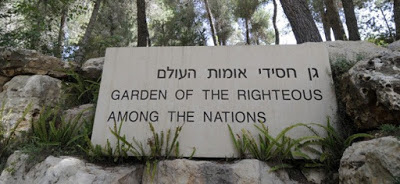Yad Vashem doesn’t have the courage to be a global beacon of conscience
 |
| Gideon Levy 24/11/2019 |
For years, Barry Lando was a senior producer for CBS’ “60 Minutes,” working alongside the legendary Mike Wallace.
Lando, an author who splits his time between Paris and London, recently visited Israel for the first time in some 20 years, with his wife, Elisabeth, who is French. An incident with Israel’s Holocaust memorial and museum, Yad Vashem, cast a shadow on their trip and caused them great distress.
“My wife, a Catholic and myself, a Jew, had mistakenly thought that that honor was conferred on Gentiles who had risked their lives to rescue Jews from the Holocaust. We were wrong,” he wrote me.
Here’s the story. Elisabeth’s grandmother and grandfather were in the French Resistance and rescued around 1,000 people who escaped from camps in Germany and German-occupied areas. Her grandfather, Antoine Maas, was the mayor of Meisenthal, a village in northeastern France, and the owner of a glass factory there. He let hundreds of refugees from the Nazis stay in the factory’s basement; some of them were Jews.
Meisenthal was under German occupation, and Maas and his family risked their lives to save these people. After the war, Maas was decorated by President Charles de Gaulle. Now, his granddaughter thought, he deserved recognition as a member of the Righteous Among the Nations.
Jessica Cohen of Yad Vashem’s Righteous Among the Nations program, to whom Elisabeth forwarded documentation of her family’s actions during the war and letters from survivors, answered that there was no doubt that her grandfather “was a brave man who was motivated by a great sense of humanity and opened his town and door to persons in need.” Nor was there any doubt that Jews were among the fugitives he rescued, but this was insufficient for the institution, she added.
Cohen wrote that “we cannot prove that the actions taken by Antoine Maas toward them was in order to save Jews,” adding that the “Righteous Among the Nations program operates according to a well-defined set of criteria and regulations. The definition of Righteous is persons who risked their lives to save Jews as Jews.”
The Landos were stunned; as Barry Lando wrote me in an email, “putting one’s life at risk to save Jews because they were fellow human beings, regardless of what religion they were, was not good enough. It was only if you saved them because they were Jews. Otherwise, don’t bother applying.
“I should add that, as a Jew, I was not just stunned – but also ashamed. In my view, there is something very dark, obscene, in such sentiments. It’s the same kind of ‘We are the Chosen People – and you are not’ morality that drives the policies of Israel and the views of so many of my fellow Jews in the world today.”
The Landos left Israel. Antoine Maas will not receive the title from Yad Vashem that is so important to his granddaughter. Still, it’s hard to ignore the harsh inferences drawn by Barry Lando. We have long grown accustomed to the idea that the Holocaust was ours alone. But when even the saving of Jews is subjected to this infuriating, narrow, ultranationalist prism – did you save them because they were Jews or because they were human beings, as if it makes any difference – one can only question the role Yad Vashem has assigned itself.
Alongside its important, impressive and tireless work to document and perpetuate the memory of the Holocaust, this grand establishment is guilty of the sin of Jewish and Israeli ultranationalism and condescension. Yad Vashem could have become a global beacon of conscience. It could have used its prestige around the world to behave as a universal institution rather than a provincial one, speaking out against crimes against humanity throughout the world, even when its victims aren’t Jews, crying out against the injustices done to persecuted minorities everywhere.
The world would listen to Yad Vashem. You don’t have to minimize the memory of the Holocaust in order to show concern for the fate of non-Jewish peoples.
There’s another step that’s surely too great for Yad Vashem and its many donors to take: to protest what the Jewish state is doing to members of a different people. There would be no finer way to memorialize the Holocaust. No conclusion can be more sublime than Never Again – also regarding the suffering of other peoples, especially when it involves crimes against international law and humanity committed by Israel.
But Yad Vashem doesn’t have the courage for this. It never will.


